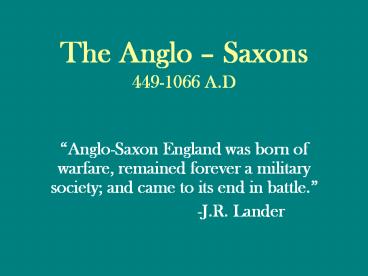The Anglo – Saxons 449-1066 A.D - PowerPoint PPT Presentation
1 / 21
Title:
The Anglo – Saxons 449-1066 A.D
Description:
The Anglo Saxons 449-1066 A.D Anglo-Saxon England was born of warfare, remained forever a military society; and came to its end in battle. – PowerPoint PPT presentation
Number of Views:420
Avg rating:3.0/5.0
Title: The Anglo – Saxons 449-1066 A.D
1
The Anglo Saxons449-1066 A.D
- Anglo-Saxon England was born of warfare,
remained forever a military society and came to
its end in battle. - -J.R. Lander
2
What kind of government did the British create?
How did this government influence the cultural
heritage of the United States?
- Political system for the people and by the
people, emphasis on personal rights and freedoms - The British not only influenced the development
and ideals of the United Stated government, but
it also had influence over our language and
literature as well.
3
Who was Great Britain invaded by?
- Iberians, Celts, Romans, Angles and Saxons,
Vikings and Normans.
4
Celtic religion Animism
- From the Latin word spirit. Celts saw spirits
everywhere in rivers, trees, stones, ponds,
fire, and thunder. These spirits/gods controlled
all aspects of existence, and they had to be
constantly satisfied.
5
Who/What were the Druids? What was their function?
- Druids were priests that acted as intermediaries
between the gods and the people.
6
What is Stonehenge? Where is it? For what do some
think it was used?
- An array of huge stones located on Salisbury
Plain in Wiltshire. Might have been used by
Druids for religious rites having to do with the
lunar and solar cycles.
7
Who wrote La Morte DArthur? Where did he get his
material for the book?
- Sir Thomas Malory Story based on Celtic legends
about a warrior named Arthur mixed with chivalric
legends know throughout Europe.
8
Why did William Butler Yeats use Celtic myths in
his poetry and plays?
- Wanted to make the Irish aware of their lost
heroic past
9
In what ways are Celtic legends different from
Anglo-Saxon stories?
- Full of strong women
- Full of fantastic animals
- Passionate love affairs
- Adventure in enchanted lands
- Magic and imagination
10
How long did it take the Romans to conquer the
Britons? What did the Romans build?
- It took aprox. 100 years to conquer the
- Britons
- They built a network of roads, a defensive
- wall, villas, and great public baths.
11
How long did the Romans stay in Britain? When the
Romans left, what did Britain have to worry
about? Why?
- For more than four hundred years
- The Romans left no centralized
- government, thus leaving Britain
- susceptible to invaders
12
Which heroic leader led an army against invading
Danes?
- King Alfred the Great
13
Who brought Christianity to England? How did
Christianity benefit the country?
- Irish and Continential missionaries began to
convert Anglo-Saxon kings to Christianity - Christianity provided a common faith and common
system of morality it also linked England to
Europe
14
What group conquered England in 1066? Who was
their leader?
- The Normans (from France)
- William the Conqueror (Duke of
- Normandy)
15
What was the order of the day for Anglo-Saxons?
- Warfare
16
What could Anglo-Saxons gain only through loyalty
to their leader? Why was loyalty extremely
important?
- Fame, success, and even survival depended on
loyalty to leader. - Loyalty grew out of the need to protect the clan
and home against enemies, encouraged a sense of
community and rule by consensus
17
With what was the religion of the Anglo-Saxons
most concerned with? With what virtues?
- gt More concerned with ethics than mysticism and
valued the earthly virtues of bravery, loyalty,
generosity, and friendship
18
Three purposes of the Anglo-Saxon communal halls
- 1.) Shelter
- 2.) Place to hold council meetings
- 3.) Space for storytellers and their audience
19
What was a bard? Another name for a bard?
- Bards are skilled storytellers that sing about
gods and heros. Anglo-Saxons called bards scops.
20
How important were the bards to Anglo-Saxons?
What instrument did they play?
- The bards ability to write and recite
poetry/stories was considered just as important
of a skill as fighting. They often played the
harp as they sang.
21
Why were fame and its reverberation in poetry so
important to the Anglo-Saxons?
- Anglo-Saxons religion was fatalistic in nature
they did not believe in the afterlife. Poetry
preserved glory/fame in the collective memory
after a hero died.































